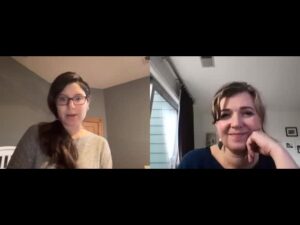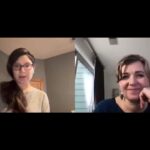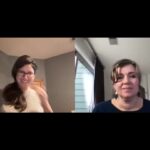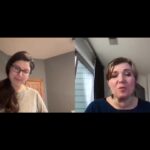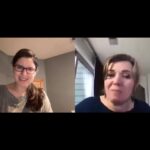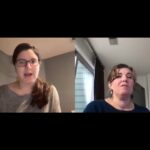Veronica Fischmann and Jenni Lippold
Description
One Small Step conversation partners Veronica (36) and Jenni (42) have a conversation about their backgrounds growing up and living in different places, their experiences living abroad in Italy, and their views on having diverse communities and perspectives in their lives.Participants
- Veronica Fischmann
- Jenni Lippold
Venue / Recording Kit
Tier
Initiatives
Keywords
Subjects
Places
Transcript
StoryCorps uses Google Cloud Speech-to-Text and Natural Language API to provide machine-generated transcripts. Transcripts have not been checked for accuracy and may contain errors. Learn more about our FAQs through our Help Center or do not hesitate to get in touch with us if you have any questions.
00:00 You. Awesome. And now I see a started recording that popped up to just quickly note that we are recording. I see my timer, which started at 50. Do you also see that? And it's counting down.
00:16 I do.
00:17 So we read step one. What else would you like to do?
00:23 I needed to scroll up to step two. Okay. So I can see it. So I'm going to introduce myself and it says, take turns reading your partner's bio out loud. So I'm going to read your bio. I didn't write a very good bio for you. I'm sorry.
00:42 It's all right.
00:45 So you're Jenni from Newberg, Oregon. You're a female aged 40 to 49, american independent. That says that you're interested in dance and lists different kinds and photography and local community outreach groups. I really want to narrate, like, respond to all of those things, but I'm going to follow the instructions. And it continues to say, you know this, but I come from a small family that moved around a lot. I was born in Lansing, Michigan. Michigan, but lived all over the Midwest, southwest, and Pacific Northwest. I've been a registered independent since I turned 18 and prefer to not be a party bound ever. I started out my career in the arts over 18 years ago, but morphed into tech since then. I married a software engineer, had two children, and bought a tree farm in Oregon. And then it says that you're a parent, active in your community, outgoing, religious and spiritual, tech savvy, creative. And that you moved to a new community and you started a new job and you lost a job and you fought with family or friends over politics.
02:00 All those things. All right, so you are Veronica from Brooklyn, New York, female, age 30 to 39, party democratic, kind of line up in the middle ish, centralish in your lineup, and you enjoy travel, cooking, oral history. Hi again. And you're active in your community. You're outgoing, religious, spiritual, tech savvy, creative. And it looks like a recent life event is you got married.
02:36 Yeah. And I think between you and me, I filled it out pretty quickly. And I believe I am actually a registered independent because I feel pretty similarly about thinking about issues rather than mindlessly voting along party lines.
02:55 Yes, I concur with that.
03:00 I think I'm having a tea delivery. Thank you.
03:03 Oh, lovely. The best set up.
03:06 I know. I abandoned it.
03:08 Beautiful house full of family, and someone brings you a hot beverage while you're working.
03:13 Well, I abandoned it when we switched locations. I left it because I was like, okay, I've got to go, so we can do this. Okay.
03:22 I like it. I feel like I'm getting a little insight to you.
03:29 Well, so then I'm going to say, ok, we've done that. I'm going to go, you know, why are we here? So, Jenny, why did you want to participate in one small stepping?
03:40 Well, I want to participate in it because I want to take the opportunity that may have different leanings than me and not for any purpose of any kind of argumentation or pulling over to my side, but really just for curiosity and to understand and the belief that I think every single person, every human being has a unique story. And that's really cool. So that's what I want to do very. How about you, Veronica? Why did you want to participate in one small know?
04:22 I have always had a really diverse network of people in my life. And I mean that politically, ideologically, racially, just I've always been in strong communities and have always prioritized having different types of thought in my life. And that's true within my family, and that's true within, again, my friends. And I think there's been this breakdown over the past number of years that people will immediately shut other people out saying, oh, this person identifies as a Democrat or a Republican. Like, oh, I hate all Republicans. Oh, I hate all Democrats. They all believe this one thing. And that's so far from my lived experience, which is full of nuanced, complicated conversations and people. And I feel like one small step is just a way to bring that to the forefront of the conversation and remind other people that it doesn't have to be black and white and that there's a lot of space for conversation.
05:31 Love it. I love that. Yes. Want to get people to be thinking about that. Tell me more about you. I guess I did cheat. I went to step four. So growing up, tell me where you grew up, what that was like.
05:51 Sure. I grew up in. I. My mom also grew up in Allentown, Pennsylvania, and I grew up about six blocks away from my grandparents. So one set of grandparents at least. And so I have a deep love of this hometown, of my hometown. I feel a real connection to it. Again, I had really great communities that I was a part of, whether it was the jewish community, which I grew up pretty active in. I horseback rode, so I would go once or twice a week to the barn that was maybe a 15 or 20 minutes drive. And there was a whole group of people there that was very different from the people at the jewish day school that I went to. That was very different from the people who I interacted with when I was at the library volunteering, because I am also a big bookworm. And so I feel like I grew up in the third largest city in Pennsylvania. That was big. It's. It's a city, and it has city components. But when I went to the grocery store that's closest to my house, the giant, most of the time, we would bump into someone we knew, and I always really loved that.
07:15 That's really sweet. I like that. When did you leave Allentown?
07:20 I left Allentown to go to college. My parents are still there for the most part, when they're not visiting their grandchildren in Boston or the Boston area. So I left Allentown around college, and I went to college at Cornell. I actually have my ithika is gorgeous mug right now.
07:45 Very nice.
07:48 And after college, I didn't really have a concrete plan, but I applied to a couple of jobs, and they were both in the New York area, and I have been in that area since. Even though I kept kind of trying to leave, I kept thinking, go back to Pennsylvania, maybe Philadelphia, which is even closer. And I have a lot of friends from high school in Philadelphia, but New York keeps sucking me back in, so I've just given in. That's where I live it.
08:20 I love it. Yeah.
08:22 What about you? Can you tell me a little bit about what it was like growing?
08:26 I. So I was born to two Michigan staters, so my parents met at Michigan State, and really interesting. They're both in areas of prep for their master's degree, so my dad was going to be. It's fascinating. He was studying to be a teacher for deaf communities. He is hearing, but he just had a love of the deaf culture. And he's a musician, so that's interesting. And his whole family are musicians. And he was really impacted by meeting some folks in the deaf community who listened through the feeling of the beats. And they used to tell him, you listen with your ears, but we listen with our hearts. And that was always his mantra. And he's like, I really want to be involved with that community. So he was going to school for that. My mom was going to school to end up prepping for her master's to become a therapist. So they met and got together and got married, and I was born, and then the two of them are just. Everybody asks, so I moved probably a dozen times in maybe six or seven years all over the US. And people are like, oh, your family in the military? I'm like, nope. Was there any problems? Nope. They just were very adventurous, I think, and had no desire to own a home or be settled. And what's weird is they both came from massive families, both of them. We're talking six kids in one family, nine in the other. Irish Catholic, both of them. And so lots and lots and lots of kids. But they just wanted to try different things. And so my brother and I grew up in all these different states, and my mom would just practice wherever she went. And my dad always, he just always found employment. I don't know, it was just very nontraditional of going somewhere and being there for the rest of your life.
10:23 I love that.
10:25 It gave me a desire for adventure, and it gave me a desire to meet lots of different people in different places. But the flip side of that is there is no place that I can look back and call home. There's no place that feels like home to me. So I'm at this new stage in my life. I mentioned in my bio that I purchased a tree farm. I live in the country with my husband, and he grew up very different than me. He grew up in the same house for 20 years and then before he headed out as a young person. But his family is very solid and have been at the same jobs in the same places for six, seven generations. In Oregon. Oregon, where I live now. And so I met him in my thirty s, or close to 30, which was good because my twenty s, I went all over the place. I lived many, many places. I lived in New York, I went to school in LA. I lived in Italy for a year, Ireland for a time. Cambodia, Vietnam, Thailand. I mean, wherever I could go and be. I just wanted to do something similar. And I got to that point where I feel like, I don't say get it out of my system, but I'm like, I want to be settled somewhere. And so that was the right spot. So now we're in good old Newburgh, Oregon, which is essentially the Portland area, but it's like the outskirts of. And my hope, and we threw everything into this place to get this property. So my hope is that this is home for my kids and my family because I never had that. So pluses and minuses, lots of adventure, lots of color, lots of people, lots of friends. When you travel as much and you live in different places, those friends are your family. So I feel like my extended family is like several hundred people, which makes keeping in touch insane. But my parents have a beautiful job of it. I don't know how my mom's crazy. Anyways, it's wonderful, but I'm glad that I finally have a place that I think I can call home, but that's a little of my background, and, oh, my parents end up moving out here, too. They chased us out here. They live down the street. Grandparents?
12:44 Well, yeah. There's so many things that you said that resonated and that I want to respond to. So many. But first, the easiest is where in Italy did you live for a year? Because I also.
13:02 I lived in a small town called materata, which is in Ancona. So if you find Rome and you drag all the way across the adriatic coast, it's on that side, and it's a small town. I had an option, because I was doing this through school, to either live the time in Rome with tons of other american students or to go and study in their satellite school in Macharada, which is a university town, italian university town with no, like, one or two other Americans. But it's an immersion program, and so I chose that, and I'm so glad I did. It was incredibly hard the first month, and then it was amazing.
13:48 I did something very similar, except in Bologna.
13:52 Very cool.
13:53 And it was the same thing where the program that I did, University of Bologna, is full of Italians, not Americans.
14:01 Yep.
14:02 I had to find my own lodging. That would be real hard because there's so many students. There are a lot of open rooms, but it was very hard. But I lived with Italians and also a Spaniard and a German, and the only language we had in common was Italian.
14:23 Yeah, right.
14:24 And I took classes in Italian. I did the oral exams in Italian with my little libretto where I got the number of what my score was, and it was just.
14:35 Yeah, I feel so bad. I've lost so much of that language. I still dream in Italian, and sometimes when we go to an italian restaurant where the people are italian and it is their restaurant, if they talk it to me, I totally get it. But forming the response, it's so rough.
14:58 It's so hard.
14:59 Makes me so sad, because I was definitely fluent by the time I left.
15:04 Same.
15:05 And then it comes and goes. It comes and goes. Like, sometimes I'll be sitting there or in a movie or something, and then my husband will be like, oh, what did they say? I'm like, oh, they said, blah, blah, blah, blah. But the processing, because I just haven't used it.
15:22 Yeah. I have a friend from study abroad. We've gotten much closer since then, actually, and we'll get together sometimes, and we'll order italian food from a nearby place and watch an italian rom.com, and we'll put the italian subtitles on so we can be reading it also, but not English. It's great.
15:49 That's really cool. I applaud you for those efforts. I tried after, I think, a good six years after that, I was still trying to stay involved in different italian community items because I was, at that point living in San Francisco. So there was plenty of italian group there, and I would go to different events and try to keep that going. And then fast forward years later and I became a mom, and I'm working and living in a metropolitan area, and you can't keep it all opportune costs of different seasons of your life. But it's such a beautiful spot, and I have dreams that someday I'll take my daughter there and it'll be really cool and we'll take a class before we go. Oh, yeah, that's my bucket list item. She's like, ten. She's like, when are we going to do that? I'm like, 1816 when I can afford it many years from now.
16:43 Totally. Well, I love that. I feel like there's a lot more we could talk about, but I'm keeping an eye on the time and know that we had until 330.
16:56 No worries. Yeah. Let's see that conversation tips. Sure.
17:05 Okay.
17:05 All right. Should we call it a day and see what happens when we close up shop?
17:10 Let's do that.
17:11 All right. And if you wouldn't mind, Veronica, you could help me test one thing that's already in production. You can stop recording and leave and x out of your screen. And I'm going to see what text message I get or what text shows on my screen. Because before it was an error, and we've since then fixed it. And I just figured instead of making Martin do another one of these with me, I'm like, well, I'm talking to Veronica anyways today, so she can just let me test it out.
17:38 Okay, so I'll hit stop recording, and then I will x out of the window.
17:43 All right.
17:44 Thanks for doing this with me. Thank you.
17:46 We'll be in touch. Yes.
17:50 I am sure that I want to stop recording this session. The video room will close in ten minutes. Feel free to use the.
